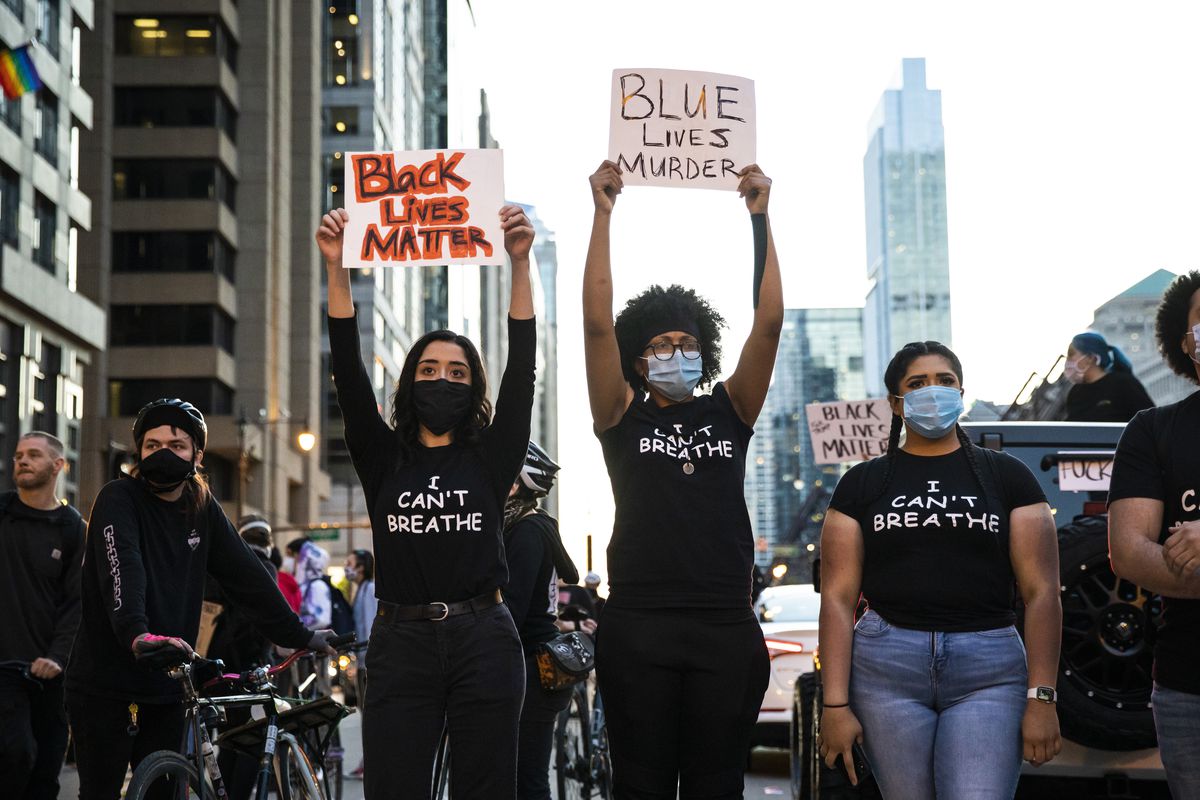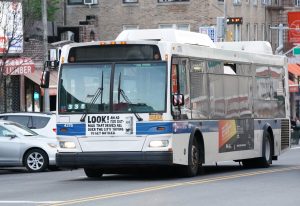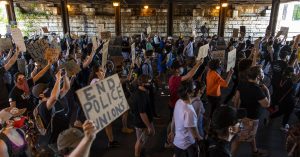The latest
Some speculated Chicago protests would spread coronavirus; Experts say they didn’t
There is little evidence that the protests that erupted after George Floyd’s death caused a significant increase in U.S. coronavirus infections, according to public health experts.
If the protests had driven an explosion in cases, experts say, the jumps would have started to become apparent within two weeks — and perhaps as early as five days. But that didn’t happen in many cities with the largest protests, including New York, Chicago, Minneapolis, and Washington, D.C.
In what’s considered the first systematic look at the question, a team of economists determined that only one of 13 cities involved in the earliest wave of protests after Memorial Day had an increase that would fit the pattern.
In many cities, the protests actually seemed to lead to a net increase in social distancing, as more people who did not protest decided to stay off the streets, said that study’s lead author, Dhaval Dave of Bentley University.
“The large-scale protests can impact both the behavior of the protesters and the behavior of the non-protesters,” said Dave. The paper was released last week by the National Bureau of Economic Research, but has not been published by a peer-reviewed journal.
Drawing from data compiled by Johns Hopkins University, The Associated Press reviewed trends in daily reported cases in 22 U.S. cities with protests. It found post-protest increases in several cities — including Houston and Madison, Wisconsin — where experts say other factors were more likely the main drivers.
News
12:04 p.m. Dart, other county sheriffs demand state prisons start accepting inmates again
With little room to spare at Cook County Jail, Sheriff Tom Dart is seeking a court order to compel the state to take custody of inmates who had been housed at the jail since the coronavirus outbreak.
The Illinois Sheriffs’ Association, which Dart is a member of, filed the motion Thursday in downstate Logan County asking a circuit court judge to approve a preliminary injunction that would order the state to accept inmates who are housed in county jails, but should be in the custody of the Illinois Department of Corrections.
These inmates — unlike detainees at the jail who are awaiting trial — have been convicted and sentenced.
Some of these inmates served their sentences but need to to be transferred to IDOC custody before their release.
Since the outbreak IDOC officials told sheriffs said they needed time to prepare new intake procedures at state facilities to contain the virus, but have continued to decline to accept transfers from county jail for months.
Read the full story from Matthew Hendrickson here.
10:01 a.m. Republicans, with exception of Trump, now push mask-wearing to fight coronavirus
In Republican circles — with the notable exception of the man who leads the party — the debate about masks is over: It’s time to put one on.
As a surge of infections hammers the South and West, GOP officials are pushing back against the notion that masks are about politics, as President Donald Trump suggests, and telling Americans they can help save lives.
Sen. Lamar Alexander, a Tennessee Republican, on Tuesday bluntly called on Trump to start wearing a mask, at least some of the time, to set a good example.
“Unfortunately, this simple, lifesaving practice has become part of a political debate that says: If you’re for Trump, you don’t wear a mask. If you’re against Trump, you do,” Alexander said.
It’s a rare break for Republicans from Trump, who earlier this month told the Wall Street Journal that some people wear masks simply to show that they disapprove of him. And the Republican nudges for the public — and the president — to embrace mask-wearing are coming from all corners of Trump’s party and even from friendly conservative media.
9:03 a.m. ‘Second wave’ could stunt national economic rebound
A resurgence of confirmed COVID cases across the South and West — and the suspension or reversal of re-openings of bars, hotels, restaurants and other businesses — is endangering hopes for an economic rebound in the region and perhaps nationally. At stake are the jobs of millions of people who have clung to hopes that their layoffs from widespread business shutdowns this spring would prove short-lived.
On Thursday, the government is expected to issue another robust monthly jobs report. Economists have forecast that employers added 3 million jobs in June, on top of 2.5 million added in May, clawing back a portion of the record-high 21 million that vanished in April at the height of the viral shutdowns.
Yet any such news might already be outdated: The jobs report won’t fully capture the impact of the COVID upsurge in the South and West and the desperate steps being pursued to try to control it. The re-closings of restaurants and bars, and resulting job cuts, mark an about-face from what appear to have been premature efforts to restart the economy before the pandemic had been contained.
“We’re still in a very deep hole,’’ said Diane Swonk, chief economist at the firm Grant Thornton. “This makes the June employment report backward-looking instead of forward-looking.’’
8:24 a.m. Illinois ends June with about half the daily COVID-19 deaths and new cases as in peak month of May
As coronavirus cases flare to record highs in other states that reopened earlier, Illinois closed out the month of June with another round of low daily numbers Tuesday, indicating the state’s pandemic curve is still arcing downward — for now.
The Illinois Department of Public Health announced 23 additional deaths attributed to COVID-19 and 724 newly confirmed cases of the virus. That raises the state’s death toll to 6,923 among the 143,185 people who have tested positive for the virus since late January.
The state averaged about half as many new cases and deaths each day in June compared to May, when Illinois hit its apparent coronavirus peak.
The state suffered almost half its overall caseload and death toll in May, with about 67,300 positive diagnoses and 3,076 lives lost. That means officials announced an average of about 99 deaths and 2,172 new cases per day.
Read the full story by Mitchell Armentrout here.
New cases
Analysis & Commentary
12:07 p.m. Minor League Baseball’s canceled 2020 season is yet another cruel blow
For all the sacrifices and deferred dreams the novel coronavirus forced upon the sports world, many are paired with some solace, knowing that there will be a next year.
One sector, from top to bottom, doesn’t have that luxury.
The long-anticipated announcement Tuesday that Minor League Baseball’s 2020 season will be canceled is a blow to thousands of minor leaguers who just saw the thankless, debt-inducing, harrowing road to the majors sidetracked, perhaps permanently.
It is a gut punch to the staffers still remaining at the 160 affiliated minor-league clubs who have held on through furloughs and pay cuts and added even more creative duties to their usual titles in the name of keeping their jobs. With an entire calendar year of virtually no revenue, many more will lose their jobs.
And — because what’s a pandemic in our country without a little opportunism? — it may represent a death knell for dozens of franchises that Major League Baseball placed on a chopping block in the service of shaving a few nickels and creating more efficiency, long-term growth of the game be damned.
Read the full guest column from Gabe Lacques in USA Today here.
7:51 a.m. Fantasizing about what to do after the pandemic is over
I’ve started to think of it as The After. I mean that time when it will be safe for me and the rest of the world to do all the stuff we used to do before COVID-19 showed up and ruined the party.
The After is the time after we’ve lived through this pandemic, those of us who do live through it.
I suspect that everyone, like me, is fantasizing about what to do in The After. What restaurant to go to. What theme park to visit. What ballet to see. What singer to hear. What park to barbeque in.
Basketball is something that I really miss, but most of the guys I’m playing with and against are over the age of 60 or, like me, over the age of 70. We aren’t going to be playing again until this COVID thing is really over. It’s just too dangerous for us to bang bodies under the board and huff and puff around the court.
I’m sure everyone — all over the world — has one or maybe many lists of what to do in The After.



















